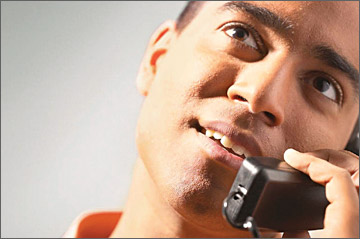|
Technology overload:
How much is too much?
Aditha Dissanayake
|

Could digital attraction actually be a digital addiction? |
Not-to-do list
It is easy to disconnect, says Tim Ferriss,
best-selling author of The 4-Hour Workweek. “The single greatest enemy
of creativity is overload,” he says. “I believe creativity requires a
relaxed acuity, which is rendered impossible by checking email every
half hour.”
* Experiment with short periods of
inaccessibility. Your life will not explode, Ferriss says.
* Leave your mobile phone at home one day a
week. Saturday is a good day to cut off email and mobile phone usage.
“For most people, it will feel like a two-week vacation,” Ferriss says.
“The psychological recovery it offers is unbelievable.”
* Set a “not-to-do list.” Don’t check email
before 10 a.m. Set intervals to check email, for example, at 10 am, 2
pm, and 4 pm Learn moderation. You don’t need to be anti-technology.
“Some is good for you, but too much is really, really bad.”
Whenever she feels bored, my dog Patch yawns , turns round in circles
and thump! falls onto the floor for a snooze. If I happen to be in the
room, every five seconds she opens one eye, wrinkles her forehead and
looks at me, as if to say why cannot I do the same? Why must I sit
huddled in front of my many screens, large and small, checking them
every few minutes and typing away as if my life depended on it? Why
can’t I disconnect, shut down and be bored for a change? (Sigh). If only
I could.

Dr. Marcel De Roos |

Prof. Erantha de Mel |
I confess I am a self diagnosed addict. I live and die inside the
inboxes of my several email accounts, day in and day out. Like Pavlov’s
dog, I react strongly when I hear the beep beep sound on my mobile phone
telling me I have a new message waiting to be opened and answered. Yes,
I used to have a life once, now I have several digital devices.
My only consolation is I know I am not alone. Chances are you are as
much an addict as I am. Chances are your life too is a tangled mess of
BlackBerries, laptops and online games.
All because of dopamine, that chemical in our brain associated with
the pleasure system. Scientists believe that the constant barrage of
digital information affects our brain chemistry because it increases
levels of dopamine. Too much dopamine can make us addicted not only to
food and drugs but technology too.
Though techno addiction is different to the other ‘addictions’ in our
lives like smoking, experts say you are an addict if you have the
following symptoms. The urge to pull out a mobile phone even when
someone you are with is in the midst of a conversation with you; sending
text messages even while your colleague is talking to you and later
wondering what he had said and feeling isolated and anxious if you are
offline for an extended period of time.
In addition to these symptoms some of us have become so ‘conditioned’
to digital devices that we believe we have to share our experiences
electronically if we are to feel they are real, so much so that even
when we are not near a computer or mobile phone, we are creating status
updates or Twitter feeds in our minds.
“The overuse and addiction to portable entertainment devices, mobile
phones, smart phones or laptops are root causes for physical and social
disengagement” says President of the Institute of Professional
Psychologists, Prof. Erantha de Mel. “People now spend a large portion
of their day checking emails and visiting social networking sites such
as Facebook, tweeting, chatting online, updating their blogs etc and
this invariably takes away their “quality time” from what they should be
doing - their main focal areas of work or studies or their time with
their families.”
Prof. De Mel compares the mobile phone to a bread knife in the
kitchen. “The bread knife can be seen as a harmless device. But it is
more than enough to kill a person!” So too the mobile phone. “There are
numerous mental health risks associated with mobile phones” explains
Prof. De Mel. “Being constantly available or reachable, regardless of
time and space, is a major stressor irrespective of actual frequency of
use of the phone by the user.”
Accessibility also implies the possibility of being disturbed at all
odd hours. “Young adults respond to peer pressure to stay up late at
night using mobile phones to send texts to their friends; which can lead
to sleep-deprivation - causing problems such as inattentiveness and
depression.” says Prof. De Mel. “In addition, mobile phone use is a
constant distraction for young adults who are engaged in educational
activities and may prevent them from completing important homework
assignments because they are unable to concentrate and pay full
attention to what they do.”
The Dutch psychologist, Dr. Marcel De Roos, who is now residing in
Sri Lanka, observes that compared with twenty years ago young people
seem to be more fidgety and restless and that they spend more time
indoors and less time with their peers. “In my general psychology
practice I treat young adults too. In the past 25 years (the last two
years in Sri Lanka) I have seen a dramatic rise in depression in this
group.” Dr. De Roos says even though “Sri Lanka has its own culture
compared with the West, use of mobile phones and the internet is part of
a “globalized world” with its own idiosyncratic norms. Overuse of the
internet can lead to isolation and depression. In order to have a
balanced emotional life one should have “real live” friends instead of
only the limited digital world of the social networking websites. Dr. De
Roos feels “fulfilling friendships are good antidotes against
depression.”
Talking about the increased use of computers Prof. De Mel, says “the
social isolation caused by increased computer usage is a serious problem
nowadays. Social networking is a menace, especially with young people.
In my opinion, social networking sites and online chat-rooms should
carry a general health warning such as - “this could raise your risk of
serious physical and mental health problems by reducing levels of
face-to-face human contact!”
But would this be of help? Don’t we all feel slightly uncomfortable
when someone suggests we are addicted to technology? Don’t we tend to
brand that person as backward, irrational or too attached to outdated
modes of communication?
This ‘addiction question’ is surely something we ask only from our
inner selves. Shouldn’t we be spending less time checking and rechecking
our many screens and more time taking part in what used to be regarded
as real life? Is there something wrong with us when we feel nervous,
irritable and tensed. In other words, when we begin to exhibit classic
withdrawal symptoms, if we are separated from our digital devices? Above
all else, how many of us have the nagging feeling that we are somehow
unable to disconnect, because the electronic devices we own have begun
to own us?
Could this mean it is high time we returned to the dust covered pre
technology, past? To the days of arrows and pigeons and smoke signals?
Not really. Not if you heed the advice of Daniel Sieberg, the author of
‘The Digital Diet’, lecturer and broadcaster on technology issues who,
in his own life, became increasingly conscious of the unhealthy hold
that digital devices can have on our daily lives.
His remedy is simple. Having accepted the fact that the technological
gadgets that have so thoroughly insinuated themselves into our lives can
become addictive he removes all his digital devices, laptops, tablets,
mobile phones, anything portable that has a screen, to another room
every night. In short, when it is time for sleep, he locks them out. He
won’t even let his mobile phone charge overnight in the bedroom. “If
it’s there, I would have the temptation to turn it on and check it” He
confesses.
Sieberg has a phrase for this kind of addiction. You know you are in
trouble when “your footing in technology feels increasingly like
quicksand.”
And he has a piece of advice for all of us, regardless of how deep we
feel we are sinking into that digital quicksand. Like him, we should
consider locking all those handheld devices that promise unlimited
distractions, in another room at night. He promises that it makes a
difference. “You sleep better.”
[email protected] |



